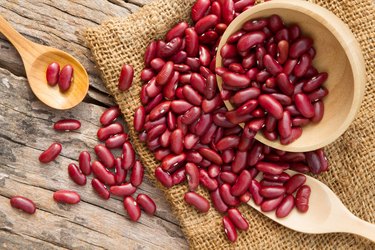
Similar to the kidney in shape and color, kidney beans provide a variety of minerals and vitamins, and so are generally beneficial for your health. If your kidneys are healthy, kidney beans can -- when consumed as part of a balanced diet -- contribute to your kidney health. If your kidneys are diseased, you might need to moderate your intake of kidney beans.
Kidney Function
Video of the Day
Your kidneys perform the decidedly unglamorous job of eliminating excess waste and water from your blood, producing urine in the process. Your kidneys filter toxins and drugs out of your bloodstream, regulate the amount of water in your skin and body and modulate the levels of potassium, calcium, sodium and phosphorus. They release hormones that help control blood pressure, strengthen bones and create blood cells. Kidney disease or dysfunction causes osteoporosis, nerve damage, high blood pressure, nutritional problems and cardiovascular disease. When untreated, kidney disease can eventually lead to death or the need for dialysis.
Video of the Day
Foods for Kidney Health
High blood pressure and diabetes both contribute to the risk of developing kidney disease. Foods that help you maintain low blood pressure and minimize your risk of diabetes therefore contribute to your kidney health. Foods that stabilize blood glucose reduce your risk of diabetes and improve kidney health. Foods that are low in saturated fats promote cardiovascular health, helping to keep blood pressure low by reducing blood pressure and LDL cholesterol. Likewise, foods that provide plenty of fiber, and especially soluble fiber, reduce your cholesterol, which lowers your risk of high blood pressure. This proves important to kidney health, since chronic high blood pressure damages the blood vessels in and around the kidneys. Foods that are low in sugar and simple carbohydrates also help maintain stable blood sugars, reducing the risk of diabetes.
Proteins, especially those from low-fat protein sources, help to stabilize blood sugar and also provide essential amino acids, necessary for the maintenance of muscles and organs. Fresh, whole foods that are low in sodium enhance kidney function. Western diets tend to provide too much sodium. Your kidneys use the process of osmosis, employing a delicate balance of sodium and potassium, to draw excess water out of your blood. When your sodium or potassium levels are too high, it can disrupt the osmosis process.
Kidney Bean Benefits
Kidney beans provide many of the nutritional qualities that promote kidney health. They contain lots of soluble and insoluble fiber and are low in fat, which enhances cardiovascular health and helps keep your blood pressure low. The high fiber in kidney beans also helps to stabilize your blood sugar. Kidney beans are low in sodium, sugar and cholesterol, and they are an excellent source of low-fat protein. For a vegetable source, kidney beans provide a wide range of amino acids. A 3.5 oz. serving of kidney beans contains almost 9 g of fiber -– about 30 percent of your recommended daily amount --- and more than 8 g of protein, but it has virtually no saturated fat. Kidney beans also provide magnesium and potassium. Deficiencies in magnesium and postassium can increase the risk of developing kidney stones.
Kidney Disease and Kidney Beans
For those with healthy kidneys, kidney beans make an excellent complement to a balanced diet, and they contribute to overall kidney health. For people who have kidney disease, however, kidney beans provide several nutrients that need to be carefully monitored and modulated. Kidney beans contain phosphorus, potassium, protein and magnesium. The kidneys filter out dietary excesses, so nutrients that are necessary for normal functioning, and which don't create an undue burden on kidneys for those who have normal kidney function, can create problems for those with kidney disease. Excess protein can accelerate the loss of kidney tissues, according to John McDougall, M.D., and the potassium, phosphorus and magnesium in kidney beans place an undue stress on the kidneys for those with chronic kidney disease.